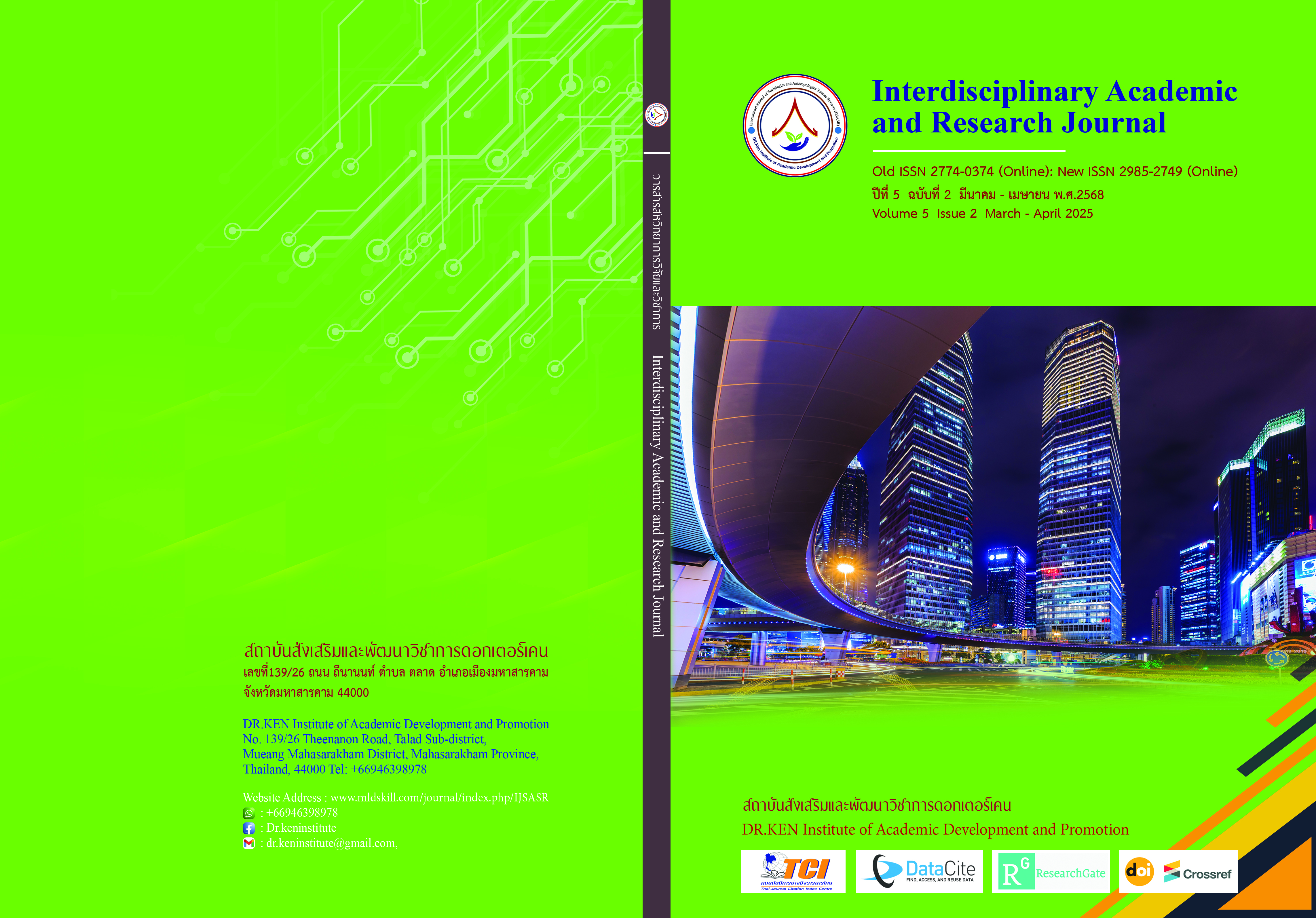Digital Library Media Used for Livelong Learning
DOI:
https://doi.org/10.60027/iarj.2025.282264Keywords:
Digital Library, Lifelong LearningAbstract
Background and Aims: Due to the advancements in technology that are becoming more common nowadays. As a result, document production has changed from the original form of printed media to other forms of media such as video or electronics, which allows more information to be stored in digital form. For this reason, the researcher is interested in this research study with the objectives of this research being: (1) to digital library Media Used for lifelong learning and (2) to study new guidelines and knowledge in digital library Media Used for lifelong learning.
Methodology: This research is mixed methods research. The sample population is 400 library users using the Cochran method, using a convenience sampling method. The tool used to collect data was an online questionnaire and qualitative research; a purposive sampling method of 18 people was used. In-depth interviews with digital library experts were used. Statistics used in data analysis include descriptive statistics, including percentage, mean, and standard deviation.
Results: (1) Using digital library media to promote a society of lifelong learning. By interviewing experts, it was found that there are 8 elements: organizational policy, objectives, and operational guidelines. Information content, working group on information technology in creating and using document storage format, Information access, and the level of media use of digital libraries to promote a society of lifelong learning. Overall, it is at the highest level. And when considering each item, it was found that the item with the highest average value was Digital information resources and online database types, followed by the characteristics of digital information resources. And the item with the lowest average value is digital information resource service and new guidelines, and knowledge in using digital library media, be ready to collect data, a digital library development plan/project has been prepared. Especially in the working group and technology in creating and using, to be clearer.Conclusion: The findings emphasize the critical role of digital library media in promoting lifelong learning by identifying key components such as organizational policy, digital information resources, and document storage and access technology. The study reveals that, while digital resources and online databases are extremely effective, improvements in digital information resource services are required to improve the overall development of digital library systems.
References
กนกกร กมลเพ็ชร. และวีรฉัตร สุปัญโญ. (2563). ภาพปัจจุบันของห้องสมุดมหาวิทยาลัยในการส่งเสริมการเรียนรู้ตลอดชีวิต วารสารวิจัย สมาคมห้องสมุดแห่งประเทศไทยฯ. 13 (มกราคม-มิถุนายน): 80-95.
กุลธิดา ท่วมสุข. (2544). การศึกษาเรื่องห้องสมุดติจิตอลในหลักสูตรบรรณารักษศาสตร์และ สารสนเทศศาสตร์. บรรณารักษศาสตร์และสะสารสนเทศศาสตร์ มข. 19(3), 1-9.
ครรชิต มาลัยวงศ์. (2542, 24 กันยายน). การพัฒนาการเรียนรู้ตลอดชีวิต. Retrieved from: www.drkanchit.com/ict_ideas/articles/lifelearn.pdf
ชนัดดา อารีวงศ์ และคณะ. (2563). การพัฒนารูปแบบห้องสมุดดิจิทัลธนาคารอาคารสงเคราะห์. วารสารวิชาการครุศาสตร์อุตสาหกรรม. พระจอมเกล้าพระนครเหนือ, 11(2), 183–194.
ธวัชชัย สุขสีดา. (2561). “มนุษย์ดิจิทัล” กับพื้นฐานการใช้ชีวิตอย่างปลอดภัยในโลกยุคดิจิทัล. เศรษฐกิจชุมชน. 11(282). 16-30 เมษายน 2561.
พิสุทธิ์ ศรีจันทร์. (2565). การศึกษาสภาพแวดล้อมการเรียนรู้ทางดิจิทัลเพื่อพัฒนาทักษะการรู้ดิจิทัลของนักศึกษา กรณีศึกษามหาวิทยาลัยราชภัฏอุตรดิตถ์. วาสารสารวิทยสารสนเทศและเทคโนโลยี. 3(2), 1-15.
วิจิตร ศรีสอ้าน. (2545). การเรียนรู้ตลอดชีวิต (Lifelong education) วารสารสออ.ประเทศไทย, 5(1), 12-18.
สมชาย สมผดุง. (2544). ความรู้เบื้องต้นเรื่องเอกสารเชิงโครงสร้าง บรรณสาร สพบ., 33(1), 43-64.
สำนักงานคณะกรรมการการศึกษาแห่งชาติ. (2543). รายงานสรุปการสัมมนายุทธศาสตร์การเรียนรู้ตลอดชีวิต. Retrieved from: http://202.143.150.11/media/ebook/pdf/4318005/pdf.pdf.
สุบิน ไชยยะ และคณะ. (2563). กลยุทธ์การบริหารห้องสมุดมหาวิทยาลัยเพื่อเสริมสร้างทักษะการเรียนรู้ตลอดชีวิตของนิสิตนักศึกษา Journal of Education Studies: 48 (2), 15. DOI: 10.58837/CHULA.EDUCU.48.2.15
สุมาลี สังข์ศรี. (2543). รายงานสรุปการสัมมนานโยบายส่งเสริมการศึกษาตลอดชีวิตของประเทศไทย. กรุงเทพมหานคร: สถาบันเทคโนโลยีการศึกษาแห่งชาติ สานักงานคณะกรรมการการศึกษาแห่งชาติ.
สุมาลี สังข์ศรี. (2544). รายงานการวิจัย การศึกษาตลอดชีวิตเพื่อสังคมไทยในศตวรรษที่ 21. กรุงเทพมหานคร: สถาบันเทคโนโลยีการศึกษาแห่งชาติ สำนักงานคณะกรรมการการศึกษาแห่งชาติ.
อุบล สุทธนะ. (2541). ห้องสมุดดิจิทัล: แนวความคิดและการประยุกต์ใช้งาน Journal of Nectec. 5(22), 29-38.
Computer Science Technology Reports. (2000). MASTER OF SCIENCE (M.S.) PROGRAM IN COMPUTER SCIENCE AND INFORMATION TECHNOLOGY (ENGLISH PROGRAM). Retrieved from https://www.chula.ac.th/program/computer-science-and-information-technology/
Hainuat, L. D. (1981). “Educational needs” in UNESCO curricula and lifelong education: Education on the move. Imprimeries de Chambery.
Leiner, M. (1998). The scope of the digital library. Retrieved from http://www.dlib.org/metrics/public/papers/dig-lib-scope.html
Likert, R. (1967). “The Method of Constructing and Attitude Scale,” in Attitude Theory and. Measurement. P.90-95. New York: Wiley & Sons.
Nordstrom, N. M. (2011). Top 10 benefits of lifelong learning. Retrieved from: http://www.selfgrowth.com/articles/Top_10Benefits_of_Lifelong_Learning.html
Downloads
Published
How to Cite
Issue
Section
License
Copyright (c) 2025 Interdisciplinary Academic and Research Journal

This work is licensed under a Creative Commons Attribution-NonCommercial-NoDerivatives 4.0 International License.
Copyright on any article in the Interdisciplinary Academic and Research Journal is retained by the author(s) under the under the Creative Commons Attribution-NonCommercial-NoDerivatives 4.0 International License. Permission to use text, content, images, etc. of publication. Any user to read, download, copy, distribute, print, search, or link to the full texts of articles, crawl them for indexing, pass them as data to software, or use them for any other lawful purpose. But do not use it for commercial use or with the intent to benefit any business.
















.png)


